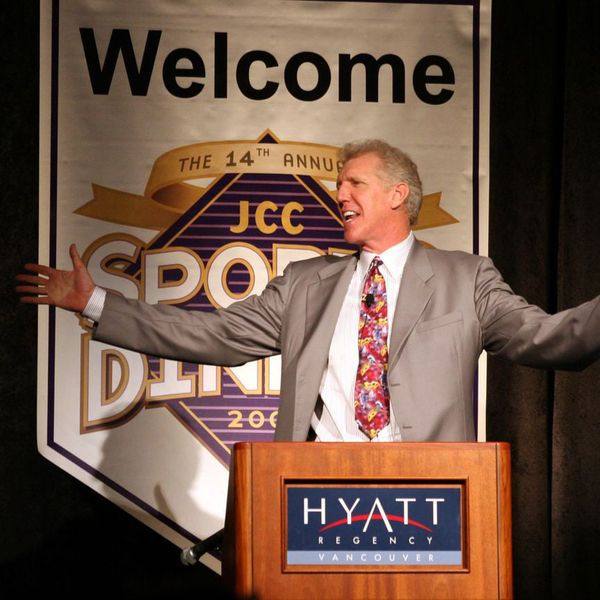Truths and Verities
- hydesollie
- May 31, 2024
- 3 min read
Updated: Jun 1, 2024
Early February, 2007.
Vancouver. The swanky Hyatt Regency hotel.
I rush through the lobby. Very late, a traffic snarl the cause. An important charity event, the annual JCC Sports Dinner, already underway.
I am nervous as well, on the hook that evening to make a short speech. A close friend, unable to attend due to professional sporting commitments, has asked me to accept a major award on his behalf.

I scramble up two flights of stairs. Reach the ballroom. Packed to overflowing, some 900 in attendance, a veritable who’s who of British Columbia executives, CEOs, and athletes. All dressed to the nines. Stunning gowns, black tie and tuxedos in equal measure. Overhead, chandeliers glitter and gleam. On the tables, glassware, plates and cutlery sparkle and shine.
Dinner, dessert and coffee flash by in the blink of an eye. With my stomach in knots, my heart pounding, the evening’s emcee calls me to the podium. I am to present the prestigious Jack Diamond Sports Award, named in honour of a
devoted family man, prominent community citizen, and generous philanthropist.
I manage a few words in support of the winner, in this case a deserving and proud British Columbian excelling in the NBA.

Steve Nash.
Soon, I return to my table, the assembled throng warm in their applause for an Olympian and two-time league MVP. For a superb performer and incredible leader, well on his way to revolutionizing the sport of basketball.
Job done, relieved, I settle in for the remainder of the evening. Look forward to some words of wisdom from the key note speaker. Like Nash, a hoop giant in his own right.

6’10”, red hair now greying, light brown jacket, outrageously coloured tie, goofy stride, he shuffles to the microphone. For close to an hour, he entertains. Life stories, tall tales, insight, advice. From his time as a college superstar at UCLA in the early 1970s, as one of the absolute greatest players in NCAA history. Twice a national champion, three times Player of the Year. In three varsity seasons, 86 wins versus only 4 defeats. The consummate “team first” player, clever and fundamentally sound. Scoring, rebounding, passing, blocking shots, dominating games with his mere presence.

Next, he moves to the NBA. If a series of crippling foot injuries hamper his career, he still leads teams to league titles. First with the Portland Trailblazers in 1977, later with the Boston Celtics in 1986. In redefining the centre position, along the way he gains countless individual accolades. All capped by induction to the Naismith Hall of Fame in 1993.
Later, overcoming a debilitating back problem and, more significantly, a speech impediment, he becomes an Emmy award winning broadcaster. Free spirited, at times eccentric, usually hilarious, he nonetheless becomes a beloved, iconic voice. His game analyses often rambling monologues, yet intelligent and entertaining in their own way. He is self deprecating, happy to poke fun at others, but, more importantly, also at himself.
He is Bill Walton.

Laughter cascades around the ballroom. The basketball junkies hanging on his every word. Yet, plenty of other themes and messages on offer as well, from appreciation and grace, to stories about his favourite band, the Grateful Dead.
The evening draws to a close. Walton leaves the stage to a standing ovation. Considerate and giving, he stays to sign autographs, chats away happily with the swarm of people surrounding him.
As I depart, I glance his way. Our eyes lock. He nods in my direction.
I reflect, and have reminisced many times since, on my own carefully chosen words that special night. How, in support of Nash, I reference the famous American novelist, William Faulkner, and his “truths and verities” of the heart. Of love and honour, pity and pride, passion and sacrifice.

And of how I think these traits would apply equally to Walton, to his work ethic and sense of joy. To his rich and successful life, to his legacy of greatness.
Because now he is gone, a victim of colon cancer this past week at the age of 71. A true legend, an extraordinary player, a brilliant broadcaster, leaving his wife, four sons, and all of us far too soon.
Most of all, going back almost twenty years in time, I recall his boundless energy and natural enthusiasm, his larger-than-life persona. And, even if personally based on little more than a brief acquaintance, I salute his clear belief that life, in every way, shape and form, should be celebrated.
A mantra that we, in what is fast becoming a darker and more troubled world, might do well to follow.




Comments